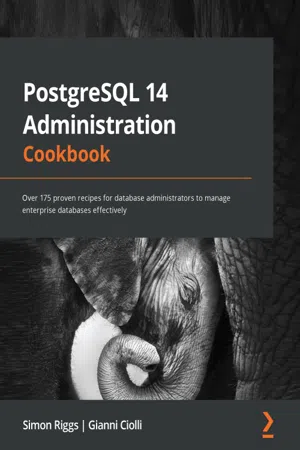
PostgreSQL 14 Administration Cookbook
Simon Riggs, Gianni Ciolli
- 608 pagine
- English
- ePUB (disponibile sull'app)
- Disponibile su iOS e Android
PostgreSQL 14 Administration Cookbook
Simon Riggs, Gianni Ciolli
Informazioni sul libro
Administer, monitor, and replicate your PostgreSQL 14 database for efficient database management and maintenanceKey Features• Troubleshoot and tackle any administration and management problems in PostgreSQL 14• Find expert techniques for monitoring, fine-tuning, and securing your database• Adopt efficient replication for high availability with PostgreSQL 14Book DescriptionPostgreSQL is a powerful, open-source database management system with an enviable reputation for high performance and stability. With many new features in its arsenal, PostgreSQL 14 allows you to scale up your PostgreSQL infrastructure. With this book, you'll take a step-by-step, recipe-based approach to effective PostgreSQL administration.This book will get you up and running with all the latest features of PostgreSQL 14 while helping you explore the entire database ecosystem. You'll learn how to tackle a variety of problems and pain points you may face as a database administrator such as creating tables, managing views, improving performance, and securing your database. As you make progress, the book will draw attention to important topics such as monitoring roles, validating backups, regular maintenance, and recovery of your PostgreSQL 14 database. This will help you understand roles, ensuring high availability, concurrency, and replication. Along with updated recipes, this book touches upon important areas like using generated columns, TOAST compression, PostgreSQL on the cloud, and much more.By the end of this PostgreSQL book, you'll have gained the knowledge you need to manage your PostgreSQL 14 database efficiently, both in the cloud and on-premise.What you will learn• Plan, manage, and maintain PostgreSQL databases in production• Work with the newly introduced features of PostgreSQL 14• Use pgAdmin or OmniDB to perform database administrator (DBA) tasks• Use psql to write accurate and repeatable scripts• Understand how to tackle real-world data issues with the help of examples• Select and implement robust backup and recovery techniques in PostgreSQL 14• Deploy best practices for planning and designing live databasesWho this book is forThis Postgres 14 book is for database administrators, data architects, database developers, and anyone with an interest in planning and running live production databases using PostgreSQL 14. Those looking for hands-on solutions to any problem associated with PostgreSQL 14 administration will also find this book useful. Some experience with handling PostgreSQL databases will help you to make the most out of this book, however, it is a useful resource even if you are just beginning your Postgres journey.
Domande frequenti
Informazioni
Chapter 1: First Steps
- Introducing PostgreSQL
- How to get PostgreSQL
- Connecting to the PostgreSQL server
- Enabling access for network/remote users
- Using the pgAdmin GUI tool
- Using the OmniDB GUI tool
- Using the psql query and scripting tool
- Changing your password securely
- Avoiding hardcoding your password
- Using a connection service file
- Troubleshooting a failed connection
- PostgreSQL in the cloud
Introducing PostgreSQL 14
- Excellent SQL standards compliance, up to SQL:2016.
- Client-server architecture.
- It has a highly concurrent design, where readers and writers don't block each other.
- It is highly configurable and extensible for many types of applications.
- It has excellent scalability and performance, with extensive tuning features.
- It offers support for many kinds of data models, such as relational, post-relational (arrays and nested relations via record types), document (JSON and XML), and key/value.
What makes PostgreSQL different?
- Robust, high-quality software with maintainable, well-commented code
- Low-maintenance administration for both embedded and enterprise use
- Standards-compliant SQL, interoperability, and compatibility
- Performance, security, and high availability
Indice dei contenuti
- PostgreSQL 14 Administration Cookbook
- Contributors
- About the authors
- About the reviewers
- Preface
- Chapter 1: First Steps
- Chapter 2: Exploring the Database
- Chapter 3: Server Configuration
- Chapter 4: Server Control
- Chapter 5: Tables and Data
- Chapter 6: Security
- Chapter 7: Database Administration
- Chapter 8: Monitoring and Diagnosis
- Chapter 9: Regular Maintenance
- Chapter 10: Performance and Concurrency
- Chapter 11: Backup and Recovery
- Chapter 12: Replication and Upgrades
- Other Books You May Enjoy